Peter MALONE
Saturday, 18 September 2021 19:45
Black Market Baby/ Don't Steal My Baby
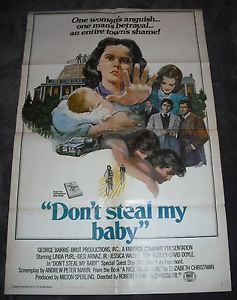
BLACK MARKET BABY (DON'T STEAL MY BABY)
US, 1977, 96 minutes, Colour.
Linda Purl, Desi Arnaz Jr, Jessica Walter.
Directed by Robert Day.
In recent years many telemovies have taken on very serious social themes and presented them emotionally to reach the home audience. This very interesting and affecting film is in this vein, exposing an adoption racket where childless San Francisco society couples can get a baby whose birth has been planned by choice of an unwitting, unmarried mother, paid father and in-the-know lawyers and doctors. The film makes us identify with a most attractive girl and her plight, as well as her determination to keep her child. The experience is designed for emotional response and a felt examination of the social and moral issues and, as such, is recommended.
1. The emotional impact of this film? Interest, entertainment? Reflection? The moralising tone of the film and its impact?
2. How authentic a story, situation, people? The background of San Francisco and the way that it was presented? The people of San Francisco,, life styles, social situations, differences of class, the wealthy society, the background of rackets? How credible?
3. The importance of the credit sequences? The introduction to Antonia, the photos and the variety of places where Antonia went? The fact that she was being pursued? Audience response to this kind of invasion of privacy and surveillance? What kind of person did she seem to be, type, behaviour, religious? An attractive and good girl? Audience puzzle over the reason for the surveillance? The transition to the background of rackets, the use of the photos, the selection of her as victim? The later photo portrait in the how? The build-up to the dramatics of the situation?
4. How well did the film draw the character of Antonia? Her presence, style, study, religious? Her family background? Her response to Steve? Her reaction to his proposals? Her moral judgments and background? Her family and the introductions, their reaction to Steve? Her reaction to them and the sexual culmination with its pregnancy repercussions and her falling victim to the racket? An ordinary attractive girl who was victimised?
5. The establishing of the racket and its background: the lawyer and his position, suave manner, deals? The couple in themselves, their anxiety, ability to pay so much money, 'to commission a baby', their psychological reaction to the situation? Having Ann's portrait? Their later taking her at the time of her need with the conspiracy of the doctor? Their hovering over her in her pregnancy, in her giving birth to the baby? The possessiveness of the mother? Her ability to face the facts when confronted by Ann after giving birth? Audience response to this kind of conspiratorial racket? Amounts of money involved? The commissioning of human life? The original title of Black Market Baby?
6. The personality of the doctor, his place in the conspiracy, his benign approach to Ann, his presence at the birth, the giving of the baby away? His watching at the end when the baby was surrendered?
7. Steve and his personality, our knowing his involvement in the racket, the motivation, the contract with the lawyer, his decision to go through with the plan? What kind of young man could actually do this kind of thing? Personality, charm, study ambitions, the need for money? His encounter with Ann, his attraction towards her and her response to him, the outings and the experiences shared? His visit to her parents and the reaction? The irony of the accuracy of their assessment - for the wrong reasons? The pressures on him? His decision to impregnate her?
8. When did he change? Falling in love with her? His arranging for her to go to the apartment during her pregnancy? The importance of the contract and her signing away the baby - the various devices he used to pressurise her? Seeing him at work, away from Ann? Her discovery about the money and going to him? The confrontation? His decision to ring about the birth of the baby? His going to her at the end and her rejection of him? Would it have been possible for them to love each other and marry?
9. The lawyer and his manner, the interviews, the plausibility of signing the contract? The background of adoptions and departments, investigations? The illegal racket in adoptions? The importance of Ann's finding the letter with the cheque?
10. The film's addition of human touches to make the situation more credible - the pregnant girlfriend and the talks of the two girls together, sharing experiences, discussing pregnancy? The background of the place where girls in such a racket would go?
11. Ann's finding the letter, her disillusionment and pain, her sense of feeling alone, her going to the doctor and her being betrayed by him, the couple and their looking after her, her portrait and the puzzle?
12. The graphic sequences of the birth of the baby, the would-be parents watching, the doctor and his sinister attitudes? Ann and her feeling of being trapped and having to have the baby in the house? The confrontation with the mother and her wanting the baby, neurotic reaction, her giving it up?
13. The response of the would-be parents in actually giving up the baby? Would It solve the crisis of their not having a child? How well was this prepared for by the discussions of the husband and wife, their talking about themselves and their family and the death of their child to Ann?
14. Steve and his final decision, the visit to the hospital? The feeling with which Ann rejected him?
15. Credible and plausible characters and events? Valuable social themes to explore? The didactic tone of the film and its moralising - how effective on an intellectual level, emotionally?
Published in Movie Reviews
Published in
Movie Reviews
Tagged under
Saturday, 18 September 2021 19:45
Black Orpheus
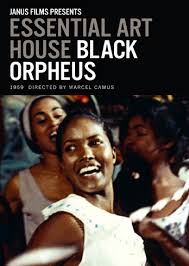
BLACK ORPHEUS
France/Italy/Brazil, 1958, 106 Minutes, Colour.
Breno Mellof, Marpessa Dawn, Adhemar Da Silva, Lourdes De Oliveira.
Directed by Marcel Camus.
Black Orpheus won the Academy Award in 1959 for the Best Foreign Language Film. It was popular as well as a critical success and this popularity has continued over several decades. The film captured something of the atmosphere of Brazil, the poverty of the cities, the odd blend of old religions, superstition and aspects of Catholicism. Carnival, with its swirl and colour, is a good occasion for this kind of exploration of Brazil. The use of the Orpheus legend is striking - accounted for by carnival and its costumes as well as the forcefulness of the original and legendary story and its themes. The music is vibrant and the main theme has been frequently recorded by orchestras over the years. The film is the work of a Frenchman, Marcel Camus. In the late 70s, he tried to re-create the magic of Black Orpheus in Otalia de Bahia but was only partially successful.
1. This film is considered a classic. Why? A film of the 50s, a film made by a Frenchman, the capturing of Brazil and its atmosphere?
2. The importance and use of colour, the vibrancy of the music and the songs, as background and for themes? The atmosphere and look of Rio?
3. How was the film a carnival film? The use of music and dancing, the continued movement and dancing, the joy of people and people on the move, crowds? Carnival and its background as beginning of Lent? A time of joy before a time of sorrow? A symbol of the events in the film? Carnival and the ethos of South America and Brazil? Its effect on people, their dressing up, gaiety, stopping all reality and business? A transition from real to fantasy?
4. How well did the film portray the classic Orpheus legend? How ingeniously was it applied? The atmosphere of pagan festivals and the carnival? The identification of the mythical characters with the real characters of Rio, eg. Hermes, Orpheus and Eurydice? The mythical locations, especially Hades and Death? What is the significance of the original legend? In terms of religion and mystery, carnival and vitality, the atmosphere of the Underworld and Death? Insight into the meaning of life, love, death? How pessimistic is the original legend? How pessimistic this version? The final rising of the sun and the children repeating the myth?
6. How important was the emphasis on 'black'? The atmosphere of the Third World? The links in the universality of human nature from Ancient Greece to the modern Third World?
7. How attractive and credible a character was Orpheus? His work on the tram, his ability with music? As a Rio type, with his girlfriend? The encounter with Eurydice? His helping her, sharing her outlook, the love and its consummation? How genuine was the love between the two?
8. The use of dance as part of the plot for the exhilaration for their relationship? Its meaning?
9. How credible and attractive was the character of Eurydice? Her arrival from the country, guidance by Hermes, arrival at her cousin's place? The object of jealousy? The pursuit by the character of Death? The gentleness and fulfilment of her love for Orpheus? Her being the substitute of the dance? Her being captured and hounded? The horror of death? The coldness of her lying in the morgue?
10. The contribution in terms of character and plot and vitality of Orpheus's original girlfriend, Eurydice's cousin?
11. The presentation of death: the mask, the voicelessness, the mime?
12. The dramatic tension of the search? The clash between the old carnival Rio atmosphere and the modern world of ambulances and hospitals, elevators and morgues? The voice and Eurydice's looking back? Orpheus's inability to face the fact that she was dead?
13. The build-up to the climax? The atmosphere of these characters on the top of the mountain? The pathos of Orpheus’s death?
14. The contribution of the minor characters, such as Hermes, the sailor?
15. The children and their presentation of Orpheus and his getting the sun to rise? The atmosphere of myth and legend? The heritage he passed on to them?
16. How significant and symbolic that the children appeared so often during the film? The symbolism of their acting out the same kind of romance in the atmosphere of dancing at the end? The fact that the sun came up again?
17. How did audiences feel at the end of this exploration of myths and relationships? The achievement of this film in presenting universal myths in modern settings for modern audiences?
Published in Movie Reviews
Published in
Movie Reviews
Tagged under
Saturday, 18 September 2021 19:45
Black Stallion, The

THE BLACK STALLION
US, 1979, 112 minutes, Colour.
Mickey Rooney, Kelly Reno, Teri Garr.
Directed by Carroll Ballard.
The Black Stallion is now considered a children's classic. On its release in 1979 it had a tremendous impact for adults and for children. One of the writers was Melissa Mathison, writer of E.T. and of An Indian in the Cupboard (as well as Martin Scorsese's Kundun). The film is based on the novel by Walter Farley. Former cinematographer Carroll Ballard has his debut as director with this film and his director of photography is Francis Ford Coppola regular Caleb Deschanel, who himself went on to direct some films.
Films about horses are perennially popular. One thinks of My Friend Flicka and National Velvet. Kelly Reno is a young boy who rescues a horse from a shipwreck. This provides for many sequences of the horse racing through the desert island, in sunshine and in storm. This spectacular photographing of a horse racing gives the film something of a mythical tone.
Mickey Rooney, who received an Oscar nomination for his performance, appears as the horse's trainer.
The film has all the right ingredients for a horse film with appeal to the widest possible audience. In 1983 there was a sequel, The Black Stallion Returns, popular but with nothing like the impact of the original.
1 . The tradition of animal stories, animal films? Children and animals and their relationship? The family audience, the content and sentiment? The treatment of this story? Its following in the traditional line? The appeal to the family audience, youngsters, boys? The appeal of films about horses?
2. The importance of the colour photography? The impact of the ship sequences, the fire and the sinking of the ship? The contrast with the beauty of the island. the sea and the shore? The photography of the horse - swimming, running, training? The transition to America and the home sequences, training, riding? The underwater photography? The editing, the special effects?
3. Audience interest in animals - the appeal of the animal and its strength. the horse and its relationship to human beings? The horse as large, powerful, wild? Its ability to be tamed? Man's control of the horse? How well were these thews presented here?
4. The themes of this boy and horse story - the credits, Alec's father's story about Bucephalus and Alexander the Great? The emblem of the horse and its being saved? The fire and the saving of the horse, the horse saving Alec? The mutual relationship and saving and taming? The boy growing up. the owning of a horse.. training him and sharing his achievement? Heroism and winning?
5. The impact of the early ship sequences - the Arabs and the horse. Alec and the sugar, the lifejacket? Alec's father and his gambling, sorting out the winnings and giving him the horse, the knife and their importance later? The sudden impact of the explosion, the fire, the panic, Alec and his father? The freeing of the horse? Alec and his falling over? The vivid subjective photography to show the panic of the sinking ship?
6. The sketch of Alec's father - friendship with his son. talking to him, telling him stories? The playing cards and the winnings? His trying to save his son?
7. Comment on the techniques used to portray the vividness of the ship explosion, the panic, not knowing what was happening, people losing contact with one another.. fire, water?
8. The character sketch of Alec - as a little boy, his life on the ship, interest in the horse? The love for his father? His being tired, the explosion, trying to keep contact with his father, freeing the horse? Falling overboard? The horse saving him? His weariness, survival on the island? The echoes of Robinson Crusoe and his surviving - and the black horse being the equivalent of black Friday? Swimming, surviving, the landscapes and the terrain? The fascination of the horse and freeing the ropes? The cobra and the black saving his life? Alec taming the horse, getting on, falling, riding and succeeding? The exhilaration of the success in taming the horse - the special camera effects to communicate this?
9. The encounter with the fisherman, Alec being saved, the saving of the horse? The ending of part one and the quick transition to part two and the changing of the tone of the film to that of America?
10. The transition to the United States - the class sequence and Alec as hero, his friends especially Becky? The black at home? Alec and his mother, the bond between the two, her grief at her husband's death, her joy at having Alec back, puzzle about the horse? Watching Alec and his behaviour - e.g. sleeping outside with the horse?
11. The significance of the black's run through the city - the re-creation of the period of the late '40s? The horse trapped in the city? The reaction of people? The streets, the cars, shops, factories. fields? Alec and his chase? The encounter with Harry and the possibilities that this opened up?
12. Harry and his age, his career, his medals (and Mickey Rooney's photo from National Velvet), his retirement, hopes? The friendship with Alec after their initial clash? Harry's offer for the horse to stay there? Harry's realisation of the power of the black? The running, the timing, the racing? Jim Neville and Alec and Harry listening to him on the radio? The scheme about running the black? The friendship with Snoe - the old black man with his friendship, dignity, advice?
13. The black and his response to Harry, Alec and the training? The runs, the timing, the build-up to the race? The radio publicity? The race itself and Alec going to be weighed, the other jockeys, the difficulties in controlling the horse at the barrier, the race itself and the success?
14. Alec and the change in his return after the trip, his mother and her puzzle, her refusal to allow him to race? Her changing her mind? The training, his fainting, the blisters? The impact of the race itself and the crowd's response? The fulfilment of a dream?
15. The American dream of success? The plausibility of this story? The modern fairy tale? The love and the bond between man and animal, the horse and its strength, the boy and his growing up? The overtones of myth? Achievement? Audiences identifying with this experience of a young boy?
Published in Movie Reviews
Published in
Movie Reviews
Tagged under
Saturday, 18 September 2021 19:45
Black Stallion Returns, The
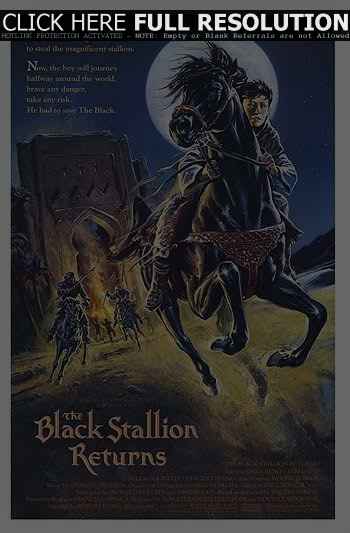
THE BLACK STALLION RETURNS
US, 1983, 98 minutes, Colour.
Hoyt Axton, Kelly Reno, Vincent Spano, Allen Goorwitz.
Directed by Robert Dalva.
One of the most popular films of 1979-80 was The Black Stallion, produced by Francis Ford Coppola and his Zoetrope Studios. The first part was lyrical beauty as boy found horse and trained him on a Mediterranean island. The second part was regular family entertainment with the training of the racehorse (by Mickey Rooney in an Oscar-nominated performance) and the friendship of horse and boy to ultimate success in a championship race. The sequel takes up where the original ended. It is also based on a novel by author Walter Farley - who wrote in the '40s.
Alec is once again played by Kelly Reno. Teri Garr makes a short appearance as his mother. However, the attraction of the present film is its North African locations with beautiful photography of the African desert. The film shows the North African way of life seen by the brash American young man. The ways of life are contrasted. There is adventure in the desert and ultimately another race. While the film lacks the novelty and lyrical poetry of the original, it has excellent desert location work and the same interesting story with appeal for all generations, boys and girls.
1. The popularity of the original film and novel? The '40s presented for the '80s? The popularity of films about horses and their training and racing? The focus on the young hero? Achievement and success? The need for a sequel?
2. The quality of the sequel in itself, in comparison with the original? Based on a sequel novel? A conscience return and presupposition of the original as regards characters and themes?
3. The appeal of the film: to American audiences, world-wide audiences? To boys, to girls? To adults? To those who love animals? The blend of the exotic with the personal and the sense of achievement?
4. The American prologue: the focus on Alec, his love for the black, the concern of his mother? The background of the five-year race in North Africa? The Berbers and the rogue tribe, the Uruks? Both groups trying to get the black? The Uruks and the fire? The Berbers and the taking of the black? Alec's chase in the horse float, to the ship? His ringing his mother, the travel agency, the tour of the flying boat and his being able to stow away, his hunger and cold, discovery? His taking chances and luck favouring him? The quick pace of the initial action?
5. The transition to African locations: Casablanca in the '40s, officialdom, the marketplace, the crowds of boys and their helping him? The truck ride into the desert? The colour photography of the desert and the variety of locations: sand, mountains, hills, oases, the village, the course for the race? Beauty and harshness? The film's using the desert atmosphere? The musical score contributing to the mood and atmosphere?
6. The focus on the tribes in the desert: their being at home, aware of the dangers, travel, animals, laws of hospitality, traditions - and the Uruks wanting to break them? Rogue tribes? The possibility of death by thirst? oases, mirages, rivers? The desert as seen through the eyes of the American boy?
7. Alec and his brashness, courage? His not being sensitive to the Arab lifestyle? Companionship, travel, traditions - eating, travelling, hospitality? The help that he received? Dangers? His focus on himself, growing awareness of others, the winning of the race and giving the black to the tribe? His attitudes being transformed?
8. Alec and his friendship with Raj, the possibility of their dying in the desert, mutual help? Rivalry in the race? Bonds of friendship? The Berber chief and the girl - suspicion and hostility? His riding the horse, helping the girl after her falls, using his wits to escape from the Uruks? Being allowed to ride and win? The Uruks - as comic villains? In America, the truck-ride, abandoning Alec in the desert, the capture of the horse? Sabotage during the race? Their finally being captured?
9. The presentation of the Arabs, both good and bad? Friendship, betrayal, double-dealing? Loyalty and support?
10. Raj and his belonging to two worlds, helping Alec, his being a rival, the taking of the horses - but his being allowed to keep his?
11. The film's focus on the horses: beauty, strength, racing, free in the desert? Audience response to the beauty of racing horses? The race itself and its excitement? Obstacles and dangers?
12. A satisfying piece of family entertainment? The American dream? The helpful contrast of the American lifestyle and attitudes with that of the tribes of North Africa? The affirming of human values?
Published in Movie Reviews
Published in
Movie Reviews
Tagged under
Saturday, 18 September 2021 19:45
Black Sunday
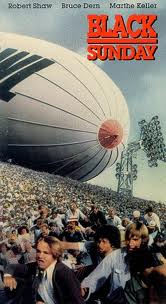
BLACK SUNDAY
US, 1976, 143 minutes, Colour.
Robert Shaw, Bruce Dern, Marthe Keller, Fitz Weaver, Bekim Fehmieu, Michael V. Gazzo, Steven Keats, William Daniels.
Directed by John Frankenheimer.
Black Sunday is a long gripping thriller that sustains considerable suspense. While the last part of the film is purely disaster material (expertly and excitingly done - farfetched realism), the intensity and audience involvement
comes from a 'dates and places' structure, but more from the political overtones of terrorism and memories of the havoc of Black September militancy. A chase sequence in Miami in mid-film is fine cinema and truly frightening as fiction reality meet with the F.B.I. pursuing terrorists in crowded streets. Marthe Keller is a coldly convincing terrorist and Bruce Dern effective as her pathological collaborator. Excellent characterizations, including Robert Shaw's Israeli commando, strong political themes.
1. Title, impact? Thriller, disaster film, political film, terrorism? Combination of both?
2. Audience response to the Black September movement, to the facts of Munich, to terrorists in general? The threat to innocent people? The political and historical facts behind terrorists and their causes? Do any of these facts justify terrorism? The terror of terrorism of this type on such a large scale?
3. The quality of colour, Panavision photography? The music, especially in the crises? The importance of the action sequences, pacing, editing? Audience involvement in the structure: names and dates and places, mounting suspense and tension?
4. The use of international locations: Beirut, Los Angeles, Washington and the focus on Miami? The atmosphere and environment of these places? The culmination in Miami in the streets, the buildings, the Super Bowl, the aerial photography?
5. The introduction to the film by way of Dahlia and her arrival in Beirut? Curiosity. sympathies and distaste because of terrorism? The nature of the Beirut meeting,, the people involved? The information about Black September and their ruthlessness? The importance of the film and Michael's introduction and his attacks on America? The importance of the associates, Dahlia and her decision to record? A well-paced atmospheric beginning for such a long film?
6. The counter-balance with the preparations for the raid: the introduction to David. to Robert? The knowledge of the audience about the schools of Israeli commandos? The editing: of Dahlia, the bedroom scene, Faisal and the arrival of the Israelis? The speed and the skill in the raid? The explosion? The rights and wrongs of such raids? Terrorism and counterterrorism?
7. The dramatic importance of David's not killing Dahlia? The focus on close-ups of faces and Dahlia's terror? David's decision and indecision? The important consequences of this? David's discussing what he should have done later? The importance of the face to face encounter at the end? A bond and a bond hostility?
8. The transition to the introduction of Michael Lander? Audience response to his film from Vietnam? The explanation of his background? Dahlia treating him as a mad child? His approaching Dahlia to do something against America? Seeing him at home and his erratic behaviour, his dependence on her? Seeing him at work in the blimp? His friendliness with the men, his hostile attitude towards authority? His work at home and his intensity? The significance of his interview with the doctor and the filling in of his background - his being humiliated in waiting for the number,. the revelation about his imprisonment and the long years, the explanation of his wife and the means taken to adapt her to the problems and not himself? How did this build up in his participation in the getting of the cargo from the ship, of his killing the Japanese captain? His intensity and his desire for a rehearsal of the explosions and his exhilaration at this? His lack of scruple in killing people? The importance of his dressing up in his uniform and medals when the project seemed to fail? The significance of his desperate speech about himself and his imprisonment, his photo of his family and his worrying about the shadow etc.? A desperate man? How mad? The importance of his motivations? America to blame for producing this kind of person? Justice and injustice towards him? The bond with Dahlia and their going into the project at the end?
9. Michael and his place in the operation, his initial skills, his job with Goodyear and the preparations for later tensions? His preparations for the Super Bowl? The audience prepared for it? The skill in his work, the erratic pulling of the gun on Dahlia, his exhilaration with the explosives? The importance of the sequence in the hangar and his genial treatment of the man whom he was to kill, his making Dahlia share in his exhilaration at the explosion and its symmetry?
10. The impact of the speedboat sequence and their skill in avoiding the coastguard?
11. The introduction of the F.B.I.? Audience interest in the F.B.I., their files, their covers? Their involvement in the case? Corley and his skill? The relationship with the Israelis? Especially with David? Corley and David working together? Their presence in Miami with so many cover police? Their involvement in the chase, David's saving Corley's life? The supervision of security by the F.B.I.? The skills in determining identity of criminals and terrorists etc.? The need for the F.B.I.?
12. The film's focus on David Kabakov? As leading the raid, his relationship with Robert? The beginning of his disillusionment, especially after the search of the ship, the experience of the Japanese captain and terrorising him? The hospital sequence and his ruminations? Robert saying that he was seeing both sides of the question? His treatment of people and murders over thirty years e.g. the terrorism of the merchant with the gun in his mouth? How was he affected by the murder of Robert? The feeling in the sequence of the coffin going on the plane? How well did he represent the relentless Israeli?
13. The importance of his decision to liaise with the Egyptians? The diplomacy and fencing of the discussion in Washington? The blackmail? The importance of the Egyptian co-operation and producing identity and file?
14. The transition to Miami - Dahlia taking the boat? The build-up to the Super Bowl match, the President being present? The possibilities of such destruction?
15. The importance of Faisal's arrival in Miami? The pressurising of Dahlia to stop? Her decision to go because Michael was dependent on her? The interaction between the two? The revelation that the F.B.I. had them covered? The importance of the chase sequence and its staging through the streets of Miami on to the beach? The importance of Faisal’s death by David? How well-paced was this action sequence in its contribution to the whole film?
16. The decision to go, the murder of Farley? How important were the deaths of so many people, especially those who worked on the blimp on the ground?
17. The atmosphere of the match, the long introduction to the football players, the singing of the national anthem? The arrival of the President? Kabakov and Corley and the suspense in trying to discover what was to happen? The importance of the collage of security measures and the way these were visualised? The discovery with the death of Farley and David's decisions? The interrogation of the TV people, the rushing to the blimp?
18. The fight of Dahlia and Michael with the blimp crew? Their desperate attempts to get the machine into the air? Their ruthlessness?
19. How important were Kabakov's decisions, especially about the helicopter? Such deaths? The movement of the blimp towards the stadium and the manoeuvring with the helicopter? How plausible, how exciting?
20. The confrontation between David and Dahlia and death? David on the blimp and the chaos in the stadium? People's reactions? Michael's attempt to light the fuse?
21. How interesting was the film in portraying people, characters? Fanaticism, ideology? Politics? Security?
22. The views on Israeli-Arab? relationships eg. through Dahlia's history as explained by the Egyptian to David? The American role eg. as blamed in Dahlia's tape?
23. The presentation of the violence, the terrorism, so many people killed? The victims and rights? What really was the film about?
Published in Movie Reviews
Published in
Movie Reviews
Tagged under
Saturday, 18 September 2021 19:45
Black Swan, The
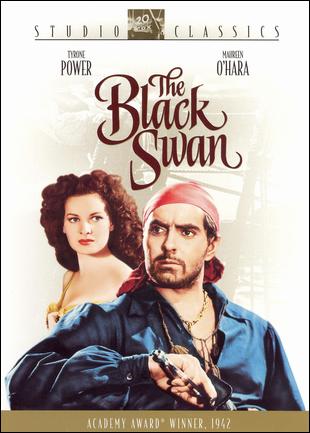
THE BLACK SWAN
US, 1942, 85 minutes, Colour.
Tyrone Power, Maureen O'Hara, Laird Cregar, Thomas Mitchell, George Sanders. Anthony Quinn, George Zucco, Edward Ashley.
Directed by Henry King.
The Black Swan is Rafael Sabatini (Captain Blood, Scaramouche) pirate story, filmed in lavish colour in the early '40s. It was one of 20th. century Fox's answers to the Warner Bros. action adventures with Errol Flynn. Tyrone Power had been in Rouben Mamoulian's Blood and Sand and The Mark of Zorro and is dashing (not quite as dashing as Errol Flynn) as Jamie Waring. Power was to work often with director Henry King (In Old Chicago, Alexander's Ragtime Band, Captain from Castille, Prince of Foxes, Untamed). Maureen O'Hara, in the early years of her Hollywood career, is, as often, a fiery heroine. Laird Cregar as the pirate Sir Henry Morgan and Thomas Mitchell as Billy Blue enjoy them selves in the supporting cast. Almost unrecognisable, except for his voice, is a red-headed and red-bearded George Sanders as the pirate Captain Leach. There is a rousing Alfred Newman score. Writing is by Ben Hecht and Seton I. Miller (who wrote The Sea Hawk). A tongue-in-cheek action adventure.
1. The popularity of the pirate films of the golden years of Hollywood? Matinee action material? The comic book action entertainment of the period? How enjoyable in later decades - despite the artificial Hollywood styles?
2. The lavish colour photography? The atmosphere of the Caribbean? The 17th. century and the English Restoration style, costumes? Action adventure? The sailing ships, the battles? The rousing musical score?
3. The tongue-in-cheek dialogue? The artificial 'historical' type language? The humour, the action - with the touch of spoof? The battles and the final swordfights? The attitude taken by the cast to their roles?
4. The basic adventure - the pirates of the Caribbean? The clashes with the Spaniards? The treaty between the English and the Spaniards? The atmosphere of the reign of Charles II? Attitudes of Empire and the ships in the Caribbean? Pirate action? English traitors? Governors and governors' daughters? The popular staple of pirate films?
5. Tyrone Power as a matinee hero? His early adventures with Henry Morgan and Captain Leach? His being captured and tortured? His becoming civilised with Sir Henry? His attraction towards Lady Margaret and their fiery interchanges? His loyalty to Sir Henry, the search for Leach? His courting and then kidnapping Lady Margaret? The deal with Captain Leach and his being found out -and the spoof of the marriage bed sequence? The final heroism and fight? Henry Morgan's final comments about the end of the Spanish Main with such romance?
6. Sir Henry Morgan as pirate, changing attitude. becoming Governor, the hostility of the previous Governor and the nobility? His pledge to clear the Caribbean? Action adventure, the final confrontation? Laird Cregar playing him as larger than life? The comparison with the Governor,. Roger Ingram and his treachery?
7. Maureen O'Hara as the fiery Lady Margaret? Glamour, romance. attitude towards Roger Ingram. hostility towards Jamie - her room. the gift, the fall from the horse. hitting him with the stone? The bedroom scene in Captain Leach's ship? Her finally calling him Jamie boy?
8. George Sanders as Captain Leach, Anthony Quinn as his assistant? The conventional picture of pirates?
9. The old traditional values of right and wrong? Heroes and heroines? Villains? The perennial popularity of this kind of film?
Published in Movie Reviews
Published in
Movie Reviews
Tagged under
Saturday, 18 September 2021 19:45
Black Veil for Lisa, A
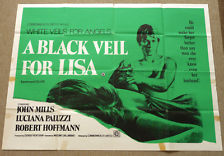
A BLACK VEIL FOR LISA
Italy, 1969, 87 minutes, Colour.
John Mills, Luciana Paluzzi.
Directed by Massimo Dallamano.
A Black Veil for Lisa is a German-Italian? co-production with an English star. It is a routine thriller with a Hamburg setting. However, it is interesting because of John Mills' presence.
The film has the background of the Hamburg police, narcotics investigations, money power in the city, drug dealings, murders? The focus is on Luciana Paluzzi's Lisa, John Mills' wife, of whom he is insanely jealous. Robert Hoffmann is the handsome hit-man. While the plot is routine, it is passable entertainment.
1. An enjoyable gangster thriller? The background of police work -and investigation? Assassinations? Double crosses? The obsession of the righteous policeman, his jealousy of his wife, his being driven by his obsession to murder?
2. The German locations, the atmosphere of Hamburg, the police division, homes, the world of drug criminals, the world of the hitmen? The style of flashy film-making of the '60s?
Musical score?
3. The irony of the title, the focus on the funeral - and its reprise at the end? Audience focus on Lisa? Her being an enigmatic character? The men's reactions to her?
4. John Mills' portrait of Inspector Bulov? His importance as head of the Hamburg police Narcotics Division? Responsibility to superiors, their pressure for him to succeed in his investigations? The drug rings of the city? The irony that all his moves seemed to be foreknown? Informants and their being murdered? The background of his marriage to Lisa, her being connected with the drug rings, his growing jealousy? The breakthrough in the case, the discovery of Max? His not arresting Max, his proposing that he murder Lisa? His obsessive accusations about Lisa's infidelity, her response to him? The irony of his discovery that Lisa is not unfaithful? His trying to stop Max murdering her? His discovery of the relationship between Max and Lisa? The confrontation with Max, his death? The irony of Lisa's connections? The portrait of a policeman?
5. Lisa - glamorous wife, under suspicion, her reaction towards her husband's jealousy and the accountability of her time, etc.? The encounter with Max, the possibility of Max's killing her, the liaison instead? The irony of her being in league with the drug boss? His knowing of her affair with Max? A black veil for Lisa?
6. Max as the hit-man, his skill in his work, cruelty, neat undetected work, his special sign? Seeing him at work? Bulov's discovery of his identity? The strange approach and the bargain for assassinating Lisa? His liaison with Lisa? The gangster boss knowing of the liaison?
7. The detail, for a melodrama, of Hamburg, its night life, criminal circles, the police? A convincing picture? Themes for popular gangster films?
Published in Movie Reviews
Published in
Movie Reviews
Tagged under
Saturday, 18 September 2021 19:45
Black Windmill, The
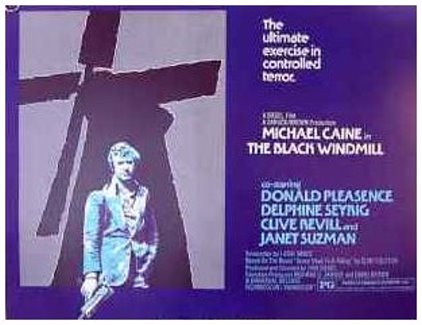
THE BLACK WINDMILL
US, 1974, 106 minutes, Colour.
Michael Caine, Joseph O'Connor, Donald Pleasence, John Vernon, Janet Suzman, Delphine Seyrig.
Directed by Don Siegel.
The Black Windmill - Donald Siegel forsakes his violent America for a spy-kidnap story set in England. The British style of restrained violence and formalised emotion is to the fore. The screenplay is not the best (Loose ends, some implausible situation contrived confession), but nevertheless, Siegel makes it all quite entertaining in its way. A more human Michael Caine heads a good caste, with Donald Pleasence in a clever performance, Delphine Seyrig unusual as a London moll, John Vernon as villain, and Janet Suzman. There are several humorous touches which help things along. It is fairly conventional material, but for those seeking entertainment, it will probably be welcomed.
1. How enjoyable a spy thriller was this? What thriller techniques did it use? How well? Was the screenplay compact and suspenseful? Or was it cumbersome? Where?
2. Was this film a good spy-film? Did it raise the questions of spying, the loss of identification, loyalty to country, manipulation by a higher superior, etc.? How interesting were the developments of these themes?
3. The film utilised some comedy. How successful were the comedy sequences and the comedy pieces of dialogue? (e.g. about Sean Connery and The Sound of Music?) The importance of the singing at the beginning and the final singing of "Chestnut"?
4. How successful was the opening for creating mood? The children singing, the child playing and then leading to strong violence? How did this keep the atmosphere for the film? What was your response to the violence? Was the film over-violent or did it have a restrained violence? The impact of this?
5. Did the audience identify with John Tarrant? Was he a typical member of the secret service? What kind of person was he? The humane aspects of his character as portrayed in the film? His attempt to break into the gang and pose as a criminal. The impact of the abduction? His trying to cope with investigating and comforting his wife? Why were relations strained with his wife? How well did he love his s In comparison with his loyalty to the secret service?
6. How much human feeling was there in the film, especially about the abduction? The function of Tarrant’s wife in this regard? How strong a character was Alex? Was she convincing? How did this give pathos to the incidents?
7. How was Harper a contrast to this? His cold humourless, businesslike carrying out of warfare? How skilful was Donald Pleasance's performance? How did Harper's personality embody the main themes of the film, as regards spying?
8. How did the main villain, contrast with this? What motivated him? How cruel and brutal? His relationship with Cell Burrows? The manner of his death?
9. The importance of Cell Burrows in the film? The development of her character in screenplay? Her stringing Tarrant along? Her manipulating of Tarrant? (The pose of the photos in his room, etc.?) Her meeting him in Paris, the irony of her being killed? And his being arrested for the murder?
10. How interesting was the picture of spies, security, police investigation, phone listening, etc.?
11. Did you have any sympathy for Tarrant’s plot to get back his son? Even if it meant violating secrets and invading the secret service? Was this the only alternative he had? How was he a victim of the secret service and its codes?
12. What was your response when you discovered the truth? The use that had been made of Tarrant, his wife, his son? The selfish motivation behind the head of t secret service and his wife?
13. Was the ending credible with the shoot-out, etc.? The investigation by Alex to find the place of the Black Windmill, etc.?
14. The film was meant merely to be entertainment. Did it succeed on this level? Did it pursue other values? Was this important for this film?
Published in Movie Reviews
Published in
Movie Reviews
Tagged under
Saturday, 18 September 2021 19:45
Burning Hills, The
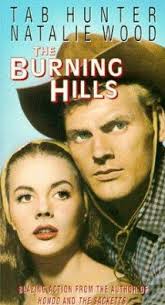
THE BURNING HILLS
US, 1956, 88 minutes, Colour.
Natalie Wood, Tab Hunter, Earl Holliman, Claude Akins.
Directed by Stuart Heisler.
The Burning Hills is a pleasingly interesting western of the mid '50s. Directed by veteran Stuart Heisler, from a screenplay by Irving Wallace from a novel by Louis Lamour, it was an early Warner Bros. Cinemascope western. It also featured young stars Tab Hunter and Natalie Wood who also appeared in The Girl He Left Behind. Hunter was popular at Warner Bros. at this period (The Sea Chase, Damn Yankees) as was Natalie Wood (Rebel Without a Cause, The Searchers). Earl Holliman and Claude Akins have roles as villains. The film has a revenge theme, conventional enough but quite well done.
1. The popularity of westerns? The appeal? The successful use of conventions, mysterious killings, rich landowners, vengeance, Mexicans helping whites, violent confrontations?
2. The qualities of 50s production: Cinemascope, colour photography, use of locations? Action sequences? The musical score?
3. Louis L'Amour and the popularity of his westerns? Adaptation by Irving Wallace and his reputation as a writer?
4. The opening situation of the killing, the mystery, the vengeance of Trace Jordan, themes of greed and power. violence and sadism on the part of the Suttons, racism. law and justice?
5. Tab Hunter’s style as Trace Jordan? Strength, investigation in the town. reaction to his brother's death. the confrontation with Sutton and shooting him, surviving after being shot, being carried by his horse through the hills, the encounter with Maria and her help, her hiding him in the mine. the escape through the back of the mine, the camp and the concealing of tracks, the pursuit, the fight? the melodramatics of cliffs and river? His being vindicated? Hero? Western type?
6. The evil of the Suttons: their greed, wealthy cattlemen. coveting the land? The tough style of the men? The macho images? The tormenting of Maria in the town? Ben and his loyalty? accusations of being soft, his confronting Jack. his death? The group and their following the leader? Jack and his evil, malice, cruelty? Old Sutton and the shooting. surviving. his rage? The gang pursuing Trace and Maria? Their fights, tracking. drinking? Their prejudice towards the guide?
7. Jack as mean and violent, torturing, the confrontation after the poisoning, his death?
8. Maria, her parents, their deaths, her brother and her uncle, racial prejudice, tough and surviving, the sheep, helping Trace, hiding him in the mine, the abuse of the men, drugging the coffee, the truth and the escape, falling in love? A lively heroine?
9. The tracker Jacob Lantz and his mixed race? His being humiliated? His skill in tracking? His warning to Trace and not shooting him?
10. A picture of the West: reality, contrived? Human rights, law, justice? Heroism? The West and the American heritage?
Published in Movie Reviews
Published in
Movie Reviews
Tagged under
Saturday, 18 September 2021 19:45
Burnt Offerings
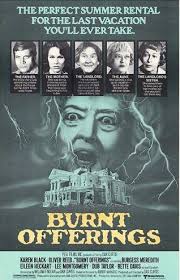
BURNT OFFERINGS
US, 1976, 115 minutes, Colour.
Karen Black, Oliver Reed, Bette Davis, Burgess Meredith, Eileen Eckhart.
Directed by Dan Curtis.
Burnt offerings is not an accurate title for this leisurely paced horror story. It leads an audience to expect too much blood and gore whereas the film relies on suggestion, character, the menace of mystery and puzzle. A mysterious house and an unseen old lady are dominant characters while on screen Karen Black, a likable Oliver Reed and their son Lee Montgomery cope with what was meant to be a summer holiday. They have Aunt Elizabeth with them in the welcome form of Bette Davis looking, however, antique. The ending is certainly unexpectedly dramatic. This highlights how an enjoyable Gothic horror might have been pruned to become a quality film. Dan Curtis worked on the Dark Shadows series.
1. The meaning of the title, its overtones of sacrifice, application to the family? Symbol? How important the relationship between symbolism and realism?
2. The film in the traditions of American horror, as contrasted with British and European horror? The focus on the house and its feeding an its victims to renew itself, the emphasis on a romantic past with sinister overtones, the menace of things on persons?
3. How did the film use the conventions of horror: the presentation of the house as sinister, with its atmosphere, sudden threats and menace, eerie happenings, the people being engulfed by the house?
4. The value of the location photography, the visual presentation of the house, gardens, pool? The audience knowing the house well and being victimized by it also? Colour, music? The blend of horror happenings within an atmosphere of realism?
5. Our introduction to the family at home, the discussion about the holidays and money, the pressures to have a holiday, the possibility of the audience identifying easily with them as the average family who then become persecuted?
6. The audience looking over the house with the family, sharing their response to the house, attracted, repelled? Marian's strong attraction overriding Ben? Sinister indications?
7. The Allardyces and their humour, eerie sinister characters, the nature of the mystery, their mother upstairs, indication of clues, their pressurizing the family?
8. How was the house made to be an important character with its presence, it old look and the ways in which it was visualized renewing itself with flowers, walls, things falling off? The eeriness of the windows, doors slamming, the pool? The ominous presence of the unseen Mrs. Allardyce?
9. The importance of the photos, the continual visualising and tracking along the photographs, a clue for what was to happen? Marian and her obsession with the photographs and Mrs. Allardyce?
10. How well did the film develop the character of each of the family, show their ordinary interaction as a family, the beginning of the holidays, strange happenings as well as ordinary happenings? The importance of the presence of Aunt Elizabeth as a character, as a comment on what was happening, as a victim? The importance of having Bette Davis?
11. The character of Marian as mother, wife, her preoccupation with tidying the house, with Mrs. Allardyce, the photos? were enough clues given for her transformation at the end?
12. The contrast with the character of Ben, ordinary family man, love for his son, the sudden violence especially in the pool, his being gassed in his room, the coinciding of the memories of the funeral and the sinister overtones of this?
13. David as an ordinary young lad, the swim and his love for his father, his fear of his father and having to get over this? The build-up towards the ominous end through his character?
14. The contribution of Aunt Elizabeth, her painting, her participation in the holiday, her growing illness, the torment of her illness at night, the build-up to her death, another victim of the house?
15. The build up to the melodramatic renewal of the house, especially by the visualizing of the storm, the effect on Ben as his son is menaced by the pool, the need for rescue?
16. The possibility of a happy ending as they decide to leave, Ben and the packing of the car, David and his anticipation? The fatal luring of Ben back into the house, Marian searching for Mrs. Allardyce? The horror of David's death, the gory build-up to Ben's death and the visualizing of it? The house winning and the revelation of what Marian had become? The final tranquillity of Marian seated, looking at the photographs, with the addition of the family?
17. The success of plot, the suspense and the drawn out nature of the screenplay? Communication from beyond ordinary human experience? People and their environment? The theme of human beings being haunted by supernatural powers?
Published in Movie Reviews
Published in
Movie Reviews
Tagged under